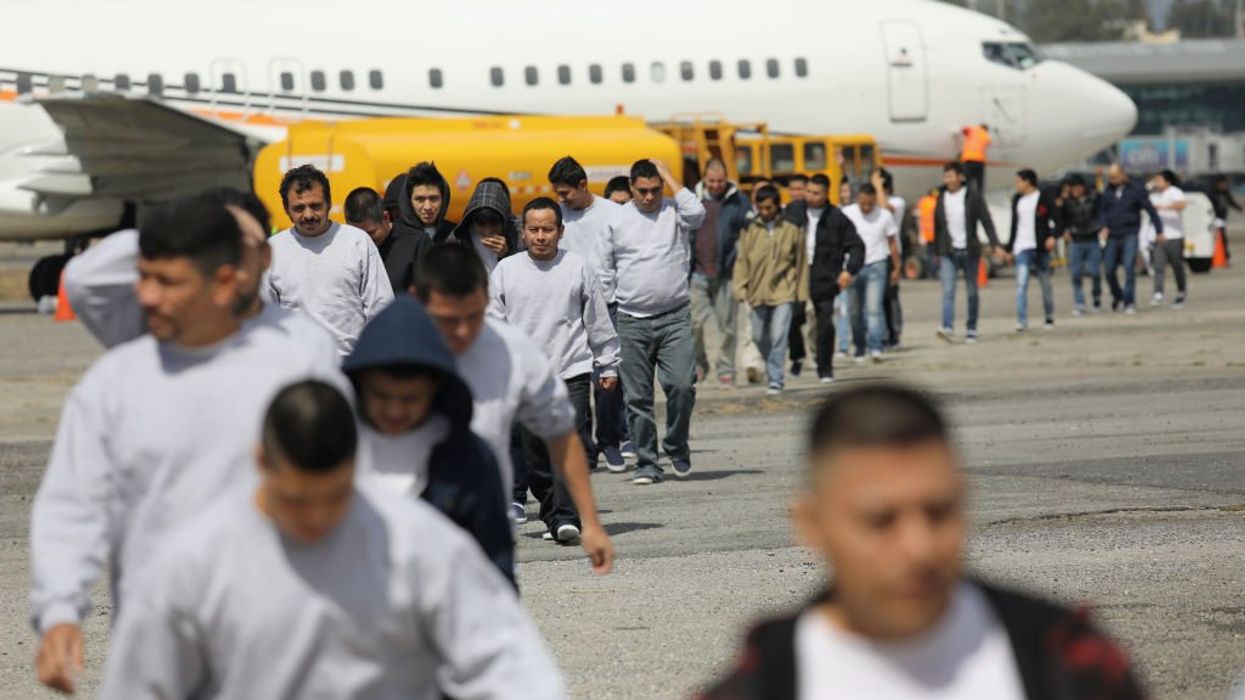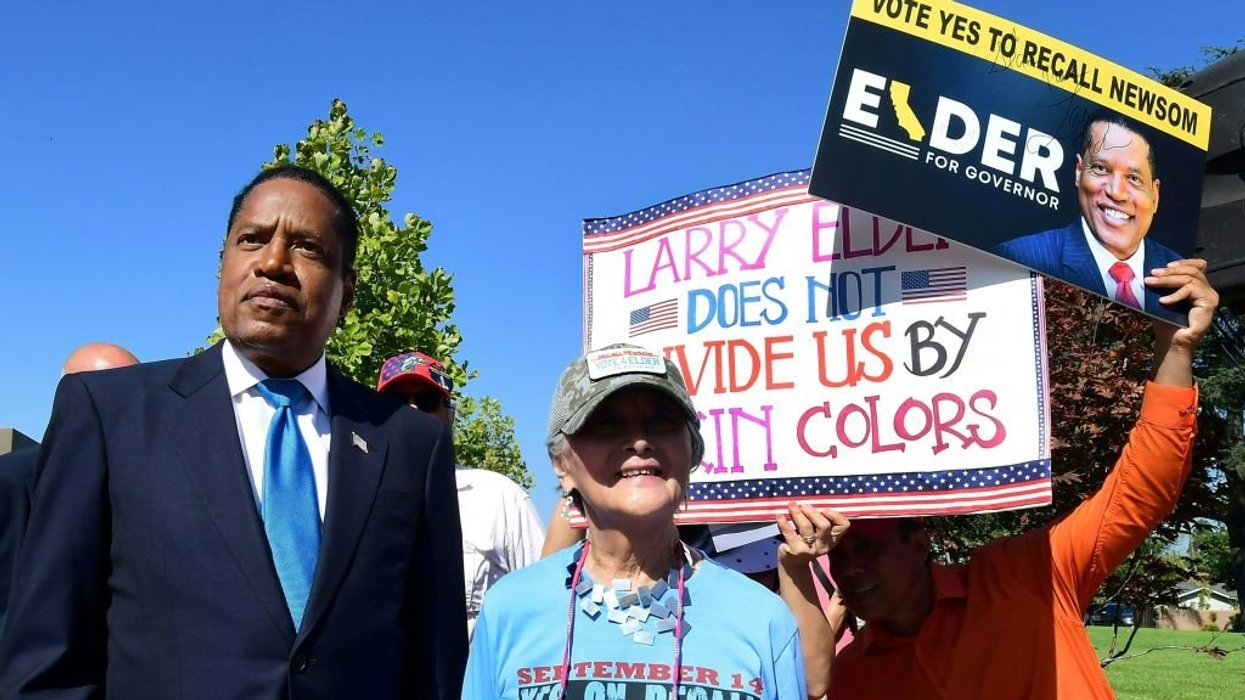© 2025 Blaze Media LLC. All rights reserved.
"Not advancing a theocratic agenda at all."
 For conservatives, the mere mention of George Soros joining forces with the Muslim Brotherhood conjures images of an unholy alliance forged in the fiery pits of Mordor.
For conservatives, the mere mention of George Soros joining forces with the Muslim Brotherhood conjures images of an unholy alliance forged in the fiery pits of Mordor.
Yet according to several reports, including one from FrontPageMag on Monday, that alliance is in fact being forged. The reports connect George Soros to the Muslim Brotherhood through his various shadow organizations including the International Crisis Group and his new spokesmen, Marwan Muasher and Mohamed ElBaradei. Soros along with Muasher and ElBaradei have consistently been featured in media downplaying the threat of the Muslim Brotherhood -- and even urged the Egyptian government to "normalize" relations with the militant group earlier in the year. Never failing to miss an opportunity to undermine the U.S. and Israel, Soros is working tirelessly to help the enemy of his enemies.
Consistently referring to Israel as the "stumbling block" to peace in the Middle East, Soros makes no bones about his hopes for the Brotherhood. He even heartily encouraged giving the Muslim Brotherhood a place at Egypt's table when the country's streets erupted into flames of dissent earlier this year.
FrontPage observes:
The numerous ties of Soros and his Shadow Party cohorts have been documented; they include the master puppeteer’s own Open Society Institute and various anti-Western Islamist groups in the revolutions. It has been confirmed, for instance, that the International Crisis Group (ICG), led in part by Soros, has long petitioned for the Egyptian government to “normalize” ties with the previously banned Brotherhood – for example, in a June 2008 report called “Egypt’s Muslim Brothers: Confrontation or Integration?” And this talking point is echoed by Brian Katulis, senior fellow at the Soros-funded Center for American Progress: “Any real democratic opening would lead to greater participation of groups like the Muslim Brotherhood in a future Egyptian government.”
To delve deeper Muasher, former deputy prime minster of Jordan, oversees research at the Soros-funded Carnegie Endowment for International Peace.
In a recent interview with prominent TV journalist Christiane Amanpour, who never misses an opportunity to promote repellent moral relativism about fundamentalist Islam, Middle East analyst Marwan Muasher declared, “The Muslim Brotherhood has been used for a long time as a scare tactic” (emphasis added). This eyebrow-raising dismissal of legitimate concerns about the world’s largest Islamist movement went unchallenged by Amanpour – no surprise there – although Muasher did weakly concede this: “that is not to say they don’t have designs.”Considering these “designs,” the group’s swift, successful entrenchment around the globe, and its spawning of such alumni as current al-Qaeda chief Ayman al-Zawahiri, only the willfully naive or complicit could claim that the Brotherhood shouldn’t be taken seriously as a threat.
Whichever Muasher is guilty of, he feels perfectly comfortable inviting the Brotherhood into the political mix of the Arab world’s current turmoil. A recent report reveals that Muasher, a former Jordanian diplomat, has praised the revolutions rocking the region and has called for the inclusion of Islamist groups in any pluralistic, fledgling democracies that may emerge. The ostensible reasoning is that Muslim fundamentalists like the Brotherhood have a legitimate role to play and deserve to be allowed to compete on the supposedly level playing field of the marketplace of ideas. It might even temper their radicalism.
ElBaradei, on the other hand, sits on the board of Soros' International Crisis Group and is reportedly seeking to run for president in Egypt.
(Not coincidentally, Mohamed ElBaradei sits on the board of Soros’ ICG, along with others who advocate dialogue with Hamas, the Muslim Brothers’ violent Palestinian branch. And as I have written elsewhere, “as the former head of the UN’s International Atomic Energy Agency… ElBaradei repeatedly stonewalled international efforts to put the brakes on Iran’s ambitions.” No friend of Israel or America, he.)But by calling for the Muslim Brotherhood to be given a seat at the table and a hand in fashioning the future of the Arab world, George Soros may be biting off more than he can chew with this alliance of convenience
A Washington Post OpEd written by Soros in February perhaps revealed the first signs of Soros' Muslim Bortherhood sympathies blooming. After unilaterally deciding America's power and influence in the world had all but vanished, Soros trivialized American and Israeli fears over the civil unrest in Egypt, and dismissed the idea that dissidents who sought to topple the Mubarak regime would be be hostile to Israel. Soros even went so far as to say the dissidents were "not advancing a theocratic agenda at all." Soros then praised the only organized political force in the region: you guessed it -- the Muslim Brotherhood.
Regarding Egypt, Soros wrote:
President Obama personally and the United States as a country have much to gain by moving out in front and siding with the public demand for dignity and democracy. This would help rebuild America's leadership and remove a lingering structural weakness in our alliances that comes from being associated with unpopular and repressive regimes. Most important, doing so would open the way to peaceful progress in the region. The Muslim Brotherhood's cooperation with Mohamed ElBaradei, the Nobel laureate who is seeking to run for president, is a hopeful sign that it intends to play a constructive role in a democratic political system. As regards contagion, it is more likely to endanger the enemies of the United States - Syria and Iran - than our allies, provided that they are willing to move out ahead of the avalanche.
The main stumbling block is Israel. In reality, Israel has as much to gain from the spread of democracy in the Middle East as the United States has. But Israel is unlikely to recognize its own best interests because the change is too sudden and carries too many risks.
Let's clarify:
- The U.S. would repair its alleged "structural weakness" and "have much to gain" by aiding dissidents -- dissidents America knew nothing about -- topple a sitting regime with which it already had good relations.
- Israel is a "stumbling block" because she fears the obvious risks associated with the establishment of an Israel-hostile Egyptian regime -- yet fails to see how embracing such a regime would be in her "own best interests."
- The Muslim Brotherhood, with its history of violence, allegedly shows promising signs it intends to embrace democracy because it cooperated with one Mohamed ElBaradei, "Nobel laureate. If past Nobel prize winners are any indication, that's not exactly encouraging.
Well that certainly is some Orwellian logic Soros has going for him.
WorldNetDaily also reveals additional details about ICG's "Egypt's Muslim Brothers Confrontation or Integration" report. ICG allegedy implored the Egyptian regime to allow Muslim Brotherhood to participate in political life and trivialized Egypt's crackdown on the Brotherhood as "dangerously short-sighted."
The ICG report also allegedly called on then President Hosni Mubarak to allow the "establishment of a political party with religious reference" i.e. Muslim Brotherhood.
While Soros heads the executive committee for ICG, some of its U.S. board members raise eyebrows as well. According to WorldNet:
U.S. board members include Zbigniew Brzezinski, who was national security adviser to Jimmy Carter; Samuel Berger, who was Bill Clinton's national security adviser; and retired U.S. ambassador Thomas Pickering, who made headlines in 2009 after meeting with Hamas leaders and calling for the U.S. to open ties to the Islamist group.
Another ICG member is Robert Malley, a former adviser to Obama during the 2008 presidential campaign. He resigned after it was exposed he had communicated with Hamas. WND reported Malley long had petitioned for dialogue with Hamas.
Given his penchant for an "all-inclusive" one world government, one wonders what Soros sees in the militant Muslim Brotherhood. Perhaps he just sees the alliance as an opportunity to side against his enemies the U.S. and Israel, and subvert their efforts abroad.
(H/T FrontPage and WND)
Want to leave a tip?
We answer to you. Help keep our content free of advertisers and big tech censorship by leaving a tip today.
Want to join the conversation?
Already a subscriber?
more stories
Sign up for the Blaze newsletter
By signing up, you agree to our Privacy Policy and Terms of Use, and agree to receive content that may sometimes include advertisements. You may opt out at any time.
© 2025 Blaze Media LLC. All rights reserved.
Get the stories that matter most delivered directly to your inbox.
By signing up, you agree to our Privacy Policy and Terms of Use, and agree to receive content that may sometimes include advertisements. You may opt out at any time.



